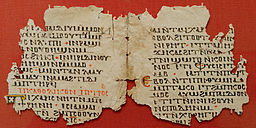Mad, bad, or God?
Jesus spent a lot of time with disreputable people. He violated the sabbath law, and encouraged others to do the same. When he saw people trying to enforce God’s law, Jesus got in the way. He told his followers to further break God’s laws by refusing to take oaths, eating unclean food, drinking blood, and hating their parents.
Jesus would go on long rants against the Jewish religious leaders. He acted like he thought he was God. He cured some people’s disabilities, only to give them to others. Jesus rudely discriminated against foreigners when they begged him to heal their children. He performed exorcisms despite knowing that it would make people worse off in the end. He sent a legion of demons to massacre someone’s livestock, just because the demons asked him to. This made everyone in that town want Jesus to go away. So he did.
Jesus said he was there to save the world, but he really just wanted to watch the world burn. He went into the temple and wrecked everything and chased the people out with a whip. He promised that those who followed him would not be excessively burdened, but then he required people to do completely pointless and unreasonably unpleasant things.
Jesus insisted on talking in confusing parables, and then got mad when no one understood him. The more he talked to people, the more they hated him. But he couldn’t figure out why. He offered people a reward, but said they could only get it if they didn’t expect a reward. People thought he was demon-possessed. Even his own family thought he was crazy.
God betrays Jesus
But there were also a lot of people who were convinced that Jesus was the Messiah, which the Jewish leaders were worried would get the Jews in big trouble with their Roman overlords. God inspired the high priest to point out that it would be better for one man to die than for the whole Jewish nation to be destroyed over the treasonous claim that Jesus was their king. So the Jewish religious leaders that Jesus had so often disparaged plotted to get him killed. Judas Iscariot, one of his disciples, agreed to get paid to hand Jesus over to them.
Jesus knew what they were planning, and he didn’t want to die. He repeatedly asked God to prevent his death if that was possible. But even though it was possible, God chose not to save him, because he wanted to see him suffer. God wanted to strike Jesus with a sword. How else could God demonstrate his righteousness and justice, if not by getting his innocent son killed instead of punishing all the actual evil people? Unless Jesus let himself be killed, God wouldn’t love him anymore.
Judas “betrays” Jesus
The religious leaders sent soldiers to arrest Jesus. Judas had arranged to let them know who they were after by kissing Jesus. But Jesus told them who he was himself, so Judas didn’t actually have to do anything. But he kissed Jesus and got paid for betraying him anyway. Later, Judas decided he didn’t want that money, and gave it back to the religious leaders, and he also used it to buy a field.
The soldiers took Jesus to the high priest. After he was questioned by the high priest, Jesus was sent off to the high priest, who for some reason wanted to know if Jesus was the son of God. When Jesus replied that he was, the high priest was shocked that Jesus would say such a thing, and the Jewish religious leaders said Jesus should be put to death for blasphemy. But though the Jewish law said Jesus had to be killed, the Jews didn’t have the right to execute anyone under Roman law.
So they handed him over to Pontius Pilate, the Roman governor of Judea, who for some reason thought Jesus was the king of the Jews. Even though no one but those astrologers had ever called him the “king of the Jews” before. And even though the Jews didn’t recognize him as their king. And even though Jesus had refused to become king of the Jews. And even though Jesus, being a descendant of Jehoiachin (AKA Jeconiah), wasn’t even eligible to be king of the Jews.
Pilate didn’t think Jesus had done anything wrong, and he wanted to release him. But the crowd insisted that he should be executed, because the Jewish leaders had somehow gotten all their people to suddenly stop liking Jesus.
So Pilate handed Jesus over to his soldiers to be crucified, while blaming the Jewish people for his decision and proclaiming himself to be innocent, as if he couldn’t overrule the commoners. (It was really God’s fault, though.) The soldiers stripped Jesus, stole his underwear for themselves, beat him, mocked him, and nailed him to a cross. He died, and was put in a tomb.
The totally convincing account of the resurrection
Continue reading The Story of the Crucifixion of Jesus—
Jesus Goes Back Home for the Weekend →
